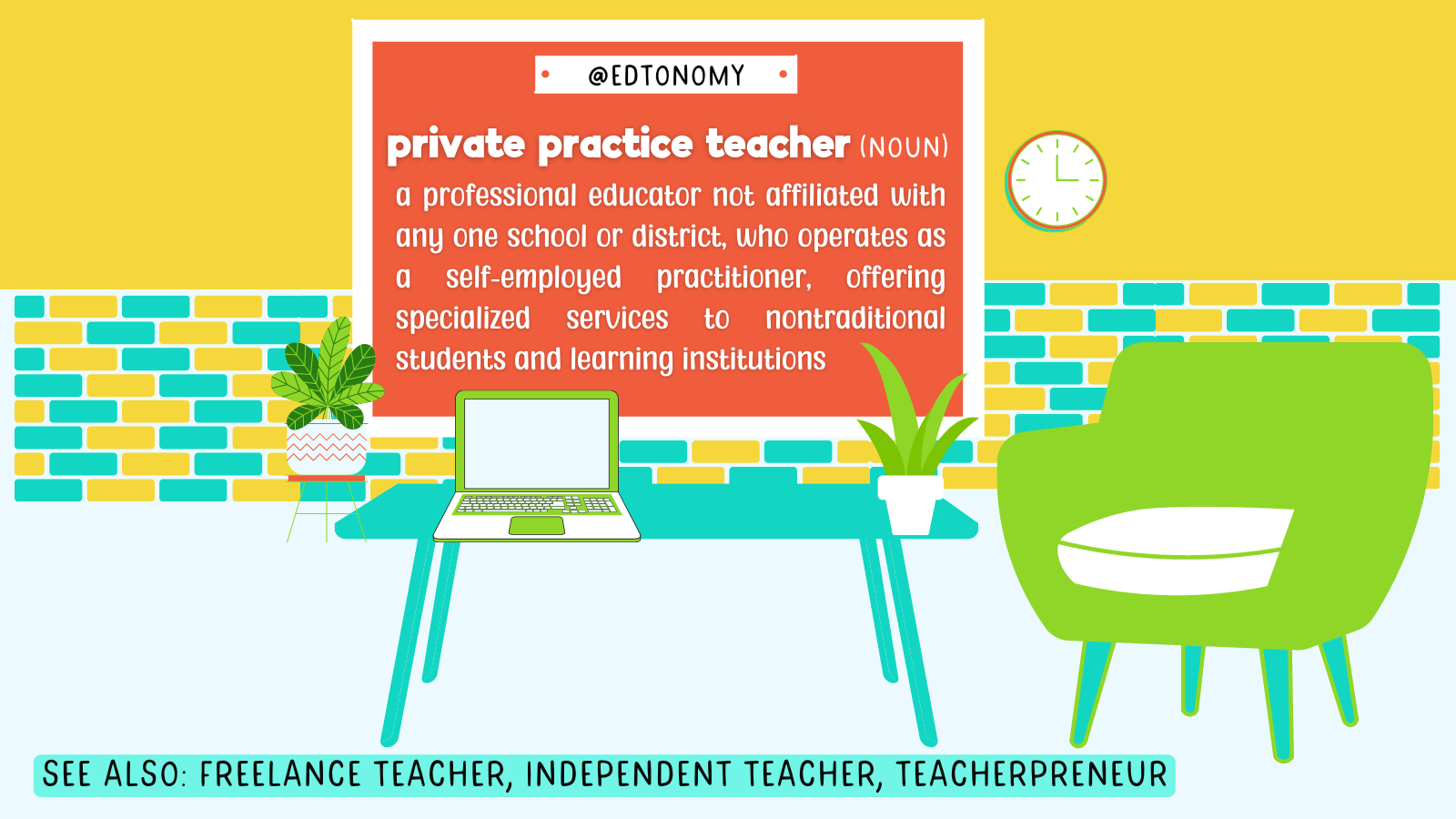The difference between tutoring and private practice teaching is in specialty. Tutoring means homework help, test prep, and often supporting another teacher’s lesson plans - and it is a crowded market. Do a Google search for academic tutors in your area. You’ll likely find a long list of tutors offering their services at a rate lower than you are/were making per hour as a classroom teacher. But Google “literacy specialist,” “math coach,” or “IEP specialist,” and that list will likely reduce by half. The difference between a tutor and a private practice teacher is like the difference between a car wash and a mechanic. While it’s nice to have your car cleaned for you, a mechanic’s services are necessary when your engine is failing or you start to hear some weird noise below the hood.
While you might stop at the car wash that’s most convenient on your commute home from work, or the one that’s offering a deal for a free tire shine this week, you’ll likely use greater discretion when selecting a mechanic. Instead of convenience, you’ll be more focused on finding someone reputable—possibly with good reviews on their Google business page, or one who comes recommended by a trusted member of your community.
But beyond the way we search for services is how we prioritize them.
Car washes, for example, are luxuries. Tight on money this week? Well, you’ve got a hose and some soap at home. On the other hand, unless you’re the kind of person who could, and would, trade in your car every time there was a problem with it, a mechanic is not a luxury. You might shop around for the best deal, but in the end, replacing a transmission is a replacing a transmission—and it’s a costly job regardless of the mechanic you select.
Money’s tight this week? Well, you can't get anywhere with no transmission...
& what’s broken needs fixing…
So you’ll just have to make your money work.
Okay, okay.
Why am I going on about car washes and mechanics? Like the car wash example, tutors are often selected based on convenience and price. I was tutoring at thirteen—thirteen! And I was charging $12.00 an hour. The parents who sought me out weren’t necessarily looking for someone with superb experience, they were looking for someone who could conveniently support their child in completing their homework or bringing up their grade in Earth Science.
And like the mechanic example, a parent looking for a specialist has a need: their child has a learning disability; they lack the support of administration at their neighborhood school; they’re homeschooling and their child is not responding to their instruction; their child needs enrichment beyond what they’re receiving in their current learning environment; though they have to work full-time, they’ve decided to pull their child out of a toxic environment after they experienced bullying or violence at school. There are a million reasons why. At the end of the day, you and I know it takes a village, and there are countless parents--in your own neighborhood!--looking for professional support.
But the traditional, brick and mortar school isn’t the only place they’re looking.
Specializing means tapping into client need. This is how you find your “high ticket” clients. By high ticket, I don’t mean they’re willing to pay a higher price for your services—at least that’s not the only thing I mean. They are “high ticket” because they are the kind of clients that value your work.
Read that again.
There's a refreshing respect and appreciation for the job you do when you step outside the classroom and into your calling as a private practice teacher and specialist. And it's because your service is not a luxury. You are filling a child’s learning gaps where others—the school system, their child’s psychologist, their parents, etc.—could not. It’s not about getting a hundred students per week—it’s about finding and taking on the right students and families: the ones who know your services will truly make a difference in their lives; the ones who energize you; the ones who respect your time, experience, and insight as a professional; the ones who aren’t looking for a $12 an hour tutor who’s barely reached high school.
So, this is your task: Take some time today to think about what you would love to teach for the rest of your days—until you retire or find some other topic for teaching that ignites you.
- Reading?
- English as a Second Language?
- Algebra?
- History?
- Technology?
- Spanish?
- Sign Language?
- Graphic Design?
- Art?
- Poetry?
- Video Game Design?
- Crafting and Sewing?
If it’s not a subject, is it an area, student age or level, or learning domain?
- Early Childhood Education
- Disability Services and Support
- Time Management & Growth Mindset
- College & Career Mentoring
- Social Emotional Learning
- Neurodiversity, Specific Learning Disabilities, Behavior Interventions
- AD/HD
- Autism
- Dyslexia, Dysgraphia, Dyscalculia, Dyspraxia
- Auditory Processing Disorder
- Secondary Education
- Adult Learners
- Academic Evaluations
But, listen up. As you consider this, be sure NOT to put yourself in a box based on what subjects or grade levels you have taught or are currently teaching as a classroom educator.
Here are a few essential questions that can guide you out of that box:
- What do you have a knack for?
- For example, I have a knack for language and linguistics. I have a good understanding of how language works, which gives me an advantage in learning and teaching reading, writing, and ESOL.
- What interests you so much you’d love to learn more about it?
- For me, this was Dyslexia. While I received lots of formal instruction in the Science of Reading (SoR) throughout my pursuit of a M. Ed. in Reading, sadly, I did not receive much formal instruction to understand the ins and outs of dyslexia. So I pursued it myself. I went into the Florida DOE’s website and took a course. I bought every book I could find. I read every journal article that I came across. And I learned! You don’t need a fancy degree or title to become an expert, as long as you allow yourself to step into those shoes.
- What do your peers, friends, family, or colleagues seek your help with?
- My family, friends, and old colleagues would always seek me out for help with grammar, editing/revising, and/or finding the right words when crafting an email. You might get the point—there’s a common theme here.
- It’s not just what you know, but who you know. What groups, social circles, or organizations are you involved with? What kinds of needs are common amongst these circles?
- I am bilingual. My husband is Venezuelan. This puts me in the midst of many Spanish speakers who are learning English or whose kids are learning English as a second language. I taught for years at a school with a large population of Hebrew speakers. Putting word out there amongst those circles helped me to find clients within them or by word of mouth.
Aright, ya’ll. Here’s the key takeaway if you skimmed until this point: Some of you might be thinking:
- Well, I don’t have a Master’s degree, or
- I’m not qualified in the area I’d really like to specialize in, or
- Who am I to consider myself a specialist?
But if there’s one thing I know, it’s this: Teachers are good at teaching because teachers are good at learning.
Take your:(years of experience) x (your pursuit of a teaching degree) x (endless professional development workshops and mandatory CPU’s)
…and, hunny, that all adds up many more qualifications than you credit yourself with.
And whatever you don’t know—well, thank God for Web 2.0. It’s 2022. Take advantage of the endless (often free) resources—online courses, books, scientific journals, YouTube videos—that can help you learn or master something new.
So here’s where I set you free.
Remember—you have homework to do!
Thinking about private practice teaching? What questions do you have? Drop them in the comments below, or subscribe to our newsletter to receive must-have resources for transitioning teachers sent straight to your inbox.
Scan this QR Code to Join Our "Teachers in Transition" Facebook Group!











Member discussion